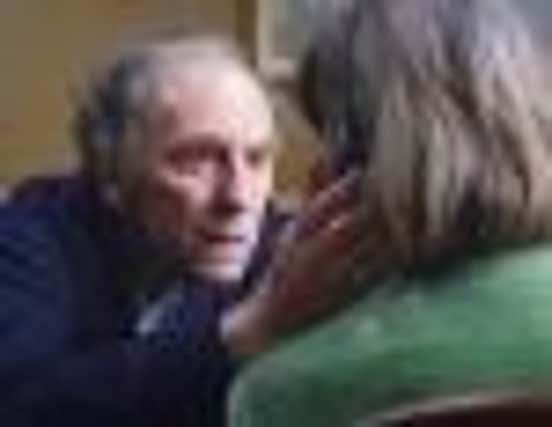Film review: Amour (12A)


Amour (12A)
Director: Michael Haneke
Running time: 127 minutes
* * *
The romantic ideal in most movies is that you find someone to grow old with – but when Haneke points his camera at a couple of devoted oldies, he turns their experience into a horror story.
Georges (Jean-Louis Trintignant) and Anne (Emmanuelle Riva) are retired and live a comfortable routine life in Paris. Both music teachers, they go to concerts or pootle around their homely flat. Very occasionally, their self-absorbed 60-year-older daughter (Isabelle Huppert) checks in on them, but mostly they are left to their own devices, until one day over breakfast, Anne suffers a seizure that leaves her briefly catatonic. It’s her first stroke, and rather quickly things get worse for her. Anne is in a wheelchair, then bedridden and unable to eat or attend to her bodily functions. Georges is struggling to cope, both physically and emotionally. Both Riva and Trintignant are icons on the new wave cinema, so there’s an additional wrench to the frailty of the once smoulderingly gorgeous “My” of My Night At Maud, and the bright star of Resnais’ Hiroshima, Mon Amour.
Advertisement
Hide AdIs this hard to watch? You betcha. But that’s Haneke’s intention: his films almost always come down to human suffering and how much of it we are prepared to watch. For instance, Funny Games, an idea he liked so much that he made it twice, grimly deconstructs our love of murderous thriller movies – but denies audiences the catharsis of a happy ending, and it’s hard to shake a niggling feeling that these movies are rather smug, unflinching exercises in things that terrify us. Mind you, a recent run of starry, soppy films about old age have tested an audience’s staying power too. The Best Exotic Marigold Hotel and Hope Springs are two recent cloying examples – and in their company, Amour appears as bracing as a wasabi bedbath.
“There’s no reason to go on living,” Anne tells her husband. “I know it can only get worse.” When they do, Haneke details everything with academic attentiveness. In the teeth of despair, Anne and Georges remain devoted – but for Haneke this allows him to punch up the film’s horror of dementia, incontinence and heartbreak. In other words, he uses sympathy as another weapon to torture the audience and deny them closure.
If this demonstrates that much of what we experience when watching films isn’t really meaningful, then this is like telling a roomful of parents that there isn’t a Santa Claus; neither profound nor devastating. And do arthouse audiences need to be rapped over the knuckles for being sentimentally inclined when Gasper Noe is still out there, crushing heads and getting audiences? Yet Haneke bangs away at his theme as enthusiastically as a Duracell bunny on a fresh pair of AA batteries – although he noticeably refuses to implicate himself in these lectures.
At least Amour isn’t an artsy bore like his White Ribbon, but I remain unconvinced that we need so many of Haneke’s films to feel as punishing as the suffering he puts on screen. Still, whether or not you need to be lectured on the uselessness of movie tears, the performances of the two astonishing French actors in Amour makes this a gripping and possibly provocative drama. «
On release from Friday